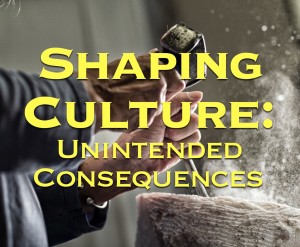 Shaping culture can be undermined by the unintended consequences of our behavior.
Shaping culture can be undermined by the unintended consequences of our behavior.
Think about the aspiration to make disciples. Sometimes we hear ourselves express it this way: “We need more leaders.” Or in frustration we say, “no one wants to step up and take charge of VBS this year.” Who is to blame? Is it merely laziness and sin? In frustration it would be easy to say that people are caught in their own lives and selfish desires and no one wants to take on responsibilities at the church. So we are left with Jane and Joe, long time volunteers, trying once again to keep the machinery of (blank) ministry going and frankly, not wanting any help either. “Other volunteers are more trouble than they are a help” they were overheard to say. But closer to the truth is that we have created or allowed this situation to develop and exist.
What are we missing? We are not seeing that “how” we do what we do yields unintended consequences. Then because of that we are left with a troubled organizational culture that works against developing people, against growing disciples and extending God’s kingdom. Things stall and sometimes even die, sometimes even the church!
Let’s put it another way. Christian leadership coach Tony Stoltzfus has said that people enter leadership when they observe something that isn’t working and say, “someone ought to do something about that…and I’m that someone!” Along those lines a pastor from a church that does a wonderful job with developing leaders recently told me, “we embrace the chaos, the whitewater.” What he meant was that they intentionally leave some things unmanaged because that is when people observe there is a need and they take the initiative and “step up” to fill the gap in leadership. Sometimes it involves a deliberate “ask” when “in the moment” things need doing (think setting up chairs or other simple tasks) and sometimes those in the moment opportunities are even manufactured! Then after the “ice is broken” on the relationship with those people (and they demonstrate they are a willing servant in something small), the more mature leaders begin to work with them and develop them to take on even more. In the context of that relationship, disciples are mentored and people grow closer to Christ. Furthermore a culture of service and inviting and involving others grows. The culture develops as a healthy place.
In plateaued and declining congregations, well meaning pastors and lay leaders work long hours, over functioning (sometimes with the mixed motives of trying to justify their value or just trying to be liked) so that things go smoothly. There is no hiccup in the working of the church (and no one really notices how hard they work). The leaders then wonder why no one seems to be satisfied and still complains. Over functioning leaders get a little annoyed at how no one new seems to want to volunteer. “Don’t they appreciate me and the long hours I work?” “After all this effort, why are people still skipping church and not getting involved and not giving their offerings for the ministry?” The culture is created of spiritual provider and consumer. Intentional disciple making is limited to attending worship and people will drop out because intuitively they don’t want to just be passive consumers.
The missing piece is the unintended consequences of over functioning so that “things go smoothly.” No we are not talking about mission critical things like worship going smoothly. We are talking about micromanaging and even “hoarding” leadership. There is no place where people can “step up” and contribute. The result is that they are more or less limited to the consumer role in the church and don’t have a sense of ownership. They have no “skin in the game” and are not fulfilled being merely a “spectator” or “consumer” in the church. It is then no wonder that they are sporadic in worship and giving and not engaged in service and faith formation. Furthermore, when we do invite people to be involved it is not an introductory small step but we want them to take on the big job of taking over where Jane and Joe (the long time volunteers) left off after 50 years. Not likely. Too big a step. Too risky.
Shaping culture can be undermined by the unintended consequences of our behavior.
Questions for all of us:
- What unintended consequences am I/we experiencing?
- How might I be over functioning and trying to make everything appear to be going well (and what is that about??)
- Where can I/we “embrace the chaos, the whitewater”? What small things can I/we intentionally let “fail” so people can notice and “step up”?
- Where can I/we invite people to serve “in the moment” to break the ice in a helping relationship? How can I/we invent ways to invite people to serve “in the moment”?
- How can I/we then affirm them later and even mentor them as disciples?
Sign up to be notified of blog updates
Scott Gress is called by Lutheran Counseling Services and partners with the FL-GA District of the Lutheran Church as an independent contractor. He specializes in Leadership Training, Consulting, Coaching and Coach Training. Contact Scott to continue the conversation or experience a free sample coaching session. 561-542-4472, scottgress@me.com or scottgress.com
